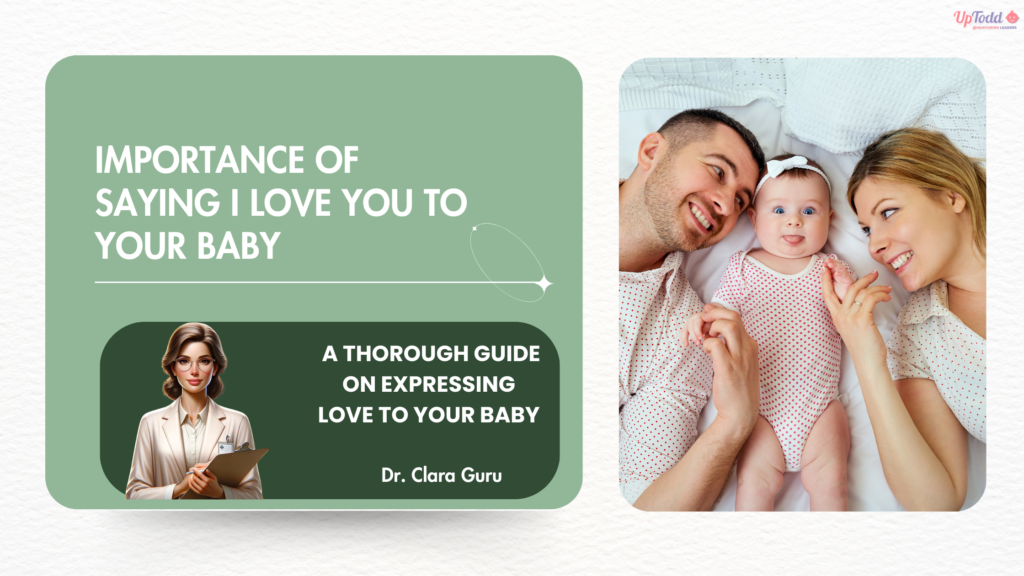
Love from parents, in all its ways, helps children feel safe and connected during their early years. Dr. Clara Guru, our child development expert, believe that the most important thing for children to grow up well is to have a strong bond with their parents, saying ” I Love You Baby” helps. This makes children feel like they always have love and support at home, which helps them have healthy relationships and feel good about themselves as they grow up.
WHY IS IT IMPORTANT TO EXPRESS LOVE TO YOUR CHILD?
Love and affection are essential for a child’s healthy brain development. The way parents respond to their children influences their self-esteem, confidence, and ability to cope with stress.
If you establish a warm, caring, and affectionate relationship with your child, they will feel safe and comfortable. This sensation of security is referred to as bonding or connection. When children feel comfortable, they are more likely to be cheerful and confident, as well as capable of dealing with disagreements and rage. If your child feels secure, they are more likely to be curious and begin exploring, which will benefit their development. It’s incredible how a “I love you baby” from parents can boost a child’s self-esteem and worth.
Reference from Passing down care: The Importance of Expressing Love to Our Children
How does the expression of emotions benefit children?
-
Love play a crucial role in a baby’s brain development
Love and affection play a crucial role in the brain development of babies, particularly in the limbic system, which includes areas like the amygdala and hippocampus. When babies receive love and affection from their caregivers, it triggers the release of oxytocin and other feel-good hormones in their brains. These hormones promote healthy brain development by strengthening neural connections and fostering emotional regulation. Love and affection also create a sense of security and trust, which are essential for building a strong foundation for cognitive and social-emotional development. In simple terms, when babies feel loved and cared for, it helps their brains grow and develop in a positive way.
-
Promotes emotional well being
According to studies, children who grew up in loving homes do better emotionally than those who grew up in love-deficit homes. Children raised in harsh environments with a lack of parental affection experience high amounts of stress and cortisol, which leads to high cholesterol, cardiovascular disease, high blood pressure, and obesity. Dr Clara also suggests that children with loving mothers have a stronger hippocampus, which is responsible for memory management, learning capacities, and stress reactions. Nurturing is a vital aspect of parenting that should be addressed.
-
Makes the child less afraid of failure
Children with neglectful parents are less secure than those with caring parents. Such babies eventually acquire a fear of failure, which makes them feel insecure in their environment. Parents with extremely high standards and criticism have children who are afraid to try new things for fear of failing.
Merit-loving parents demonstrate affection based on test scores, which might have an impact on their children’s social and academic lives. Sensitive parents will encourage them to enhance their skills for their own fun and development, rather than to prove themselves. A loving parent provides a strong and sturdy foundation for a child, inspiring courage and encouraging them to take chances.
-
Stronger Sense of Self-Worth
Children who are regularly shown love by their parents have higher levels of self-confidence. They are more confident in self-expression and more in touch with themselves. On the other hand, children who lack reassurance may develop low self-worth and feel disconnected from themselves and the world. Regular affection from parents uplifts children, providing support during tough times and empowering them to thrive. Children also learn that their worth is not dependent on what they have done, but who they are.
Creates Affection Between Parent and Child
All parents want to have a loving bond with their children. Love always helps a child to cooperate better and please more easily. This lowers the chance of risky behaviour, better judgement and the ability to keep themselves away from substance abuse in college life and beyond. Expressions of love and care will also strengthen the parent-child bond during family hardships. Children resent controlling behaviour, but disciplining them with love makes them feel cared for.
Reference from Make time for love and affection (suitable from birth)
Building a Lifetime of Love: Embracing the Journey Together
“Building a Lifetime of Love emphasises that a parent’s love for their child lasts a lifetime and changes over time. Dr. Clara Guru, our child development expert, supports this idea. It stresses the importance of nurturing and maintaining this bond as the child grows. It’s about recognizing that love between parent and child is a journey filled with both good and bad times, as well as moments of happiness and shared memories. It highlights that love is more than just a feeling; it’s a commitment to support, nurture, and care for each other through life’s challenges. So Saying “I love You Baby” helps
FAQS
-
- Why is it important for children to feel loved and supported during their early years?
-
- How does expressing love and affection contribute to a child’s emotional well-being?
-
- What role does parental love play in a child’s brain development?
-
- How does a nurturing and affectionate relationship with parents impact a child’s self-esteem and confidence?
Explore UpTodd to unleash hidden abilities of the baby
